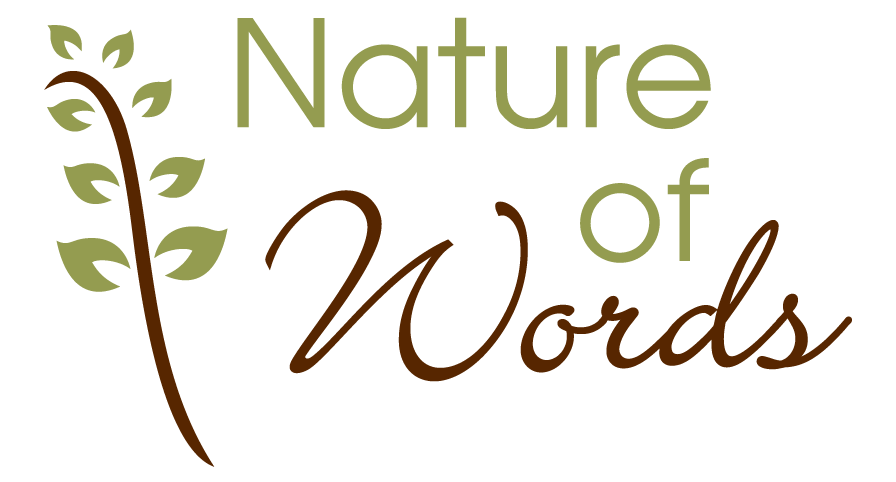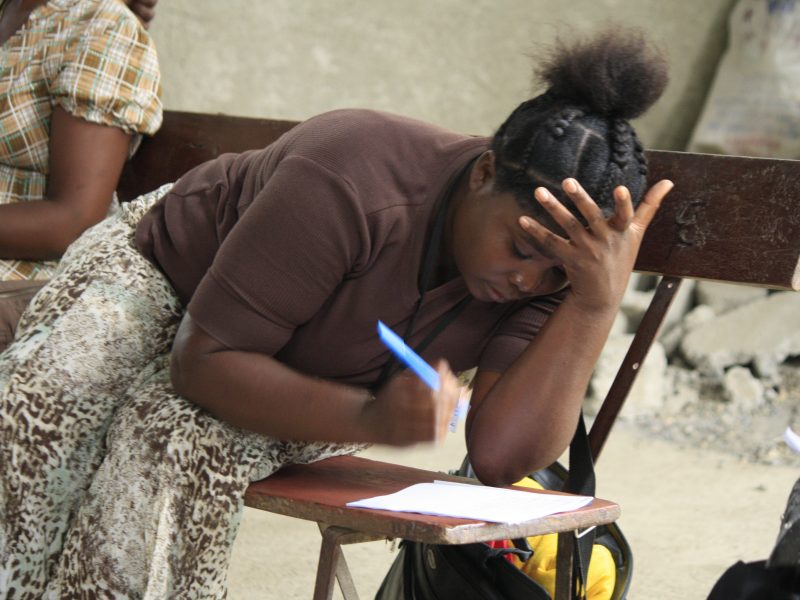
The Write Stuff
A New Brunswick writer travels to Haiti to help Haitians document their memories and experiences for future generations, and returns with a clearer understanding of the power of words to strengthen, and to heal.
My companions and I sat loose-limbed, our heads bobbing from side to side like dashboard ornaments, as our rental truck inched over rock-face that was more goat path than road. We were six hours into our journey to Mombin Crochu, a village in Haiti’s remote northern mountains, when the truck came to an abrupt halt at the bottom of a gully.
We climbed out and stood mute, regarding the front end. The tires looked cross-eyed.
“We’re done,” announced Rick, after crawling underneath. “This is the end of the road.”
A tie-rod bolt had fallen off. We were hours from the nearest vehicle repair, miles from any village. We had no tool kit, no cell coverage and certainly no replacement parts. We did have a few bottles of water and a couple of protein bars between us, but we’d been on the road since 4AM and hunger pangs had started.
It was my third day in Haiti, and home seemed very far away.
How it began
I’d travelled alone from New Brunswick to deliver a series of nine writing workshops at the request of Ambassadeurs Medicaux d’Haiti (AMDH), a non-profit community-development organization in Haiti—a country that’s been rated the poorest in the Western Hemisphere. The work would be based in the small rural villages of the north, far away from the earthquake zone, but affected nonetheless by its aftermath.
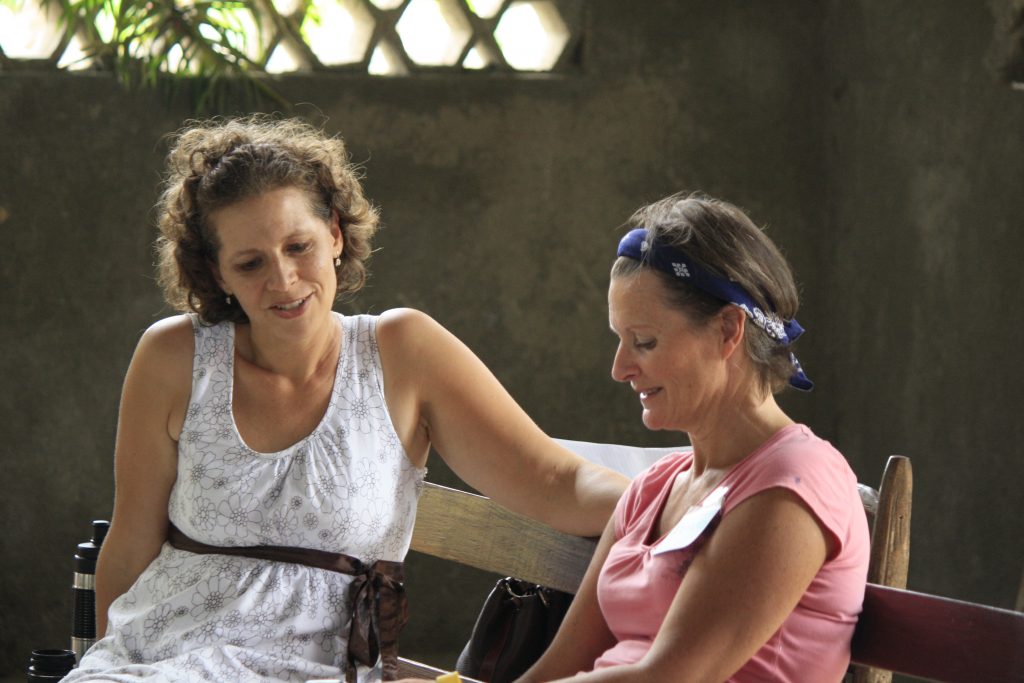
Nurse Practitioner Rhonda Hamilton and translator Dr. Elizabeth Fleming (Photo D. Carr)
This pilot project was the vision of New Brunswick nurse practitioner, Rhonda Hamilton who, with her husband, Rick, was completing an internship with the organization. Rhonda had attended one of my writing workshops at home and when she told her Haitian team members what I did, they were excited.
She emailed me their request: “She can help us write what is on our minds. Ask her if she will come.”
As I read those words, my heart was already in transit, but my head lagged behind. I was apprehensive about travelling alone, fearful I would not be strong enough to touch Haiti’s poverty without flinching, worried about navigating the cultural differences. The writer in me welcomed a chance to experience Haitian life, but I wasn’t sure how I would teach North American writing techniques in a culturally sensitive manner. Could we find a common ground from which to begin?
There were other concerns: Could I physically withstand an ambitious three-week schedule of workshops and travel? And—perhaps most importantly—I knew this experience would be life-changing. Could I accept the changes it might bring?
“You cannot prepare for this,” a friend noted. “All you can do is deliver yourself, open and honest, and see what can be done with what you are able to share.”
Life in the Haitian mountains
Ultimately, there was no way of knowing without going, so here I was: Stranded in the Haitian mountains with Rick, Rhonda, AMDH’s director, Ossé St. Juste, and our translator, Dr. Elizabeth Fleming.
As Rick worked on the truck, we watched women washing clothes in a stream beside the road. Despite their labours, they seemed to be enjoying each others’ stories, and the distraction of our predicament.
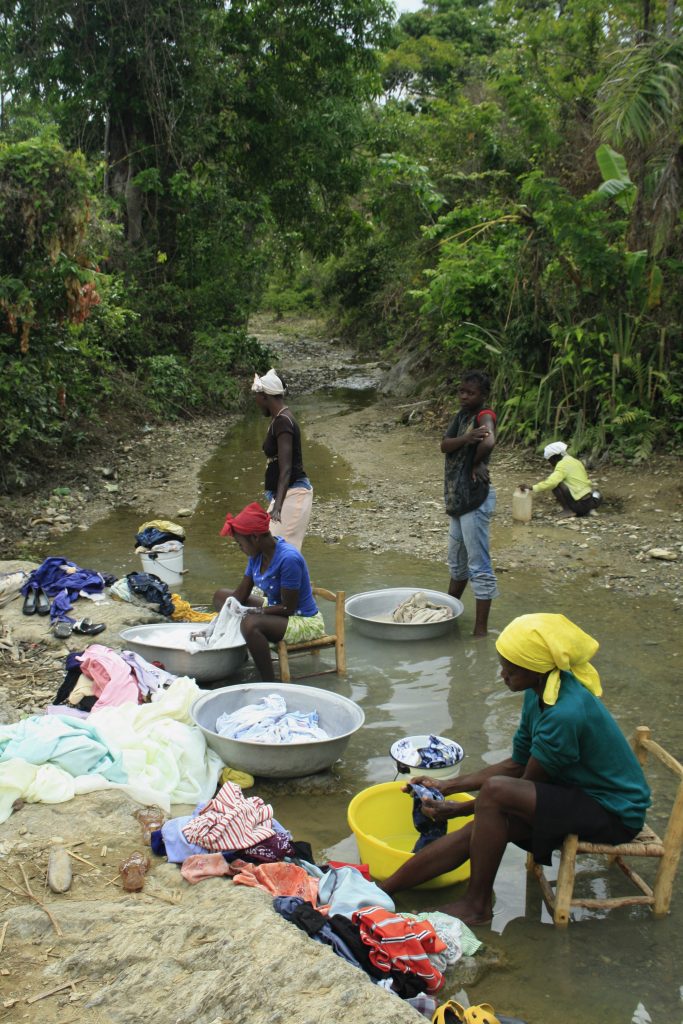
Laundry Day (Photo D. Carr)
They had brought along large basins, handmade chairs and wooden paddles for beating the clothing and linen. I wondered how far they had walked to reach this shallow pool and how heavy the wet clothes would be on their journey home. We had passed women balancing everything from wide, shallow baskets of grain to 40-pound buckets of water on their heads, a skill they learned as soon as they were old enough to walk alone.
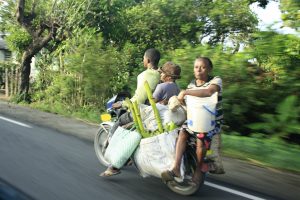
Hiring a motorcycle is an economical way to travel in Haiti; it’s common to see up to five people on one bike. (photo D. Carr)
Eventually, a motorcyclist sold us a bolt removed from his own bike, and we were on our way again, albeit several hours delayed. We passed through a number of marketplaces where people bargained for legumes and coffee, dry goods, cooked food, fresh meat, live animals, used car parts and clothing. I watched a child buy a square of bread the size of a quarter and another a handful of peanuts measured out in a bottle cap.
Throughout these marketplaces and at roadsides, gaunt animals grazed and chickens wandered freely. Rhonda once asked a woman how she knew which was chicken was hers. The woman looked at her, incredulous. “If you owned something, wouldn’t you know it was yours?”
As we climbed higher, forging shallow streams flowing over the road, I noted the hills stripped of trees. Rhonda said the wood was cut and charred to make charcoal, their favoured fuel for cooking fires, and then the steep hillsides were planted with Congo beans, corn, carrots, and other crops. I tried to imagine the strain of farming on these treacherous slopes.
Ossé, who is Haitian, explained that a joupa–a small shelter constructed near a distant field–may house an entire family for weeks at a time during the cultivating, planting, harvesting seasons. His words reminded me of Newfoundland’s summer fishing shacks and how, although the work was gruelling, families looked forward to the time spent together there.
By the time we arrived at our destination, we had been on the road for nine hours, yet had travelled only 80 kilometres. Inside a building with dirt floors, a group of 14 Haitian men and women had been patiently waiting for us. A number of them had walked several hours to be there, and they were singing hymns to pass the time.
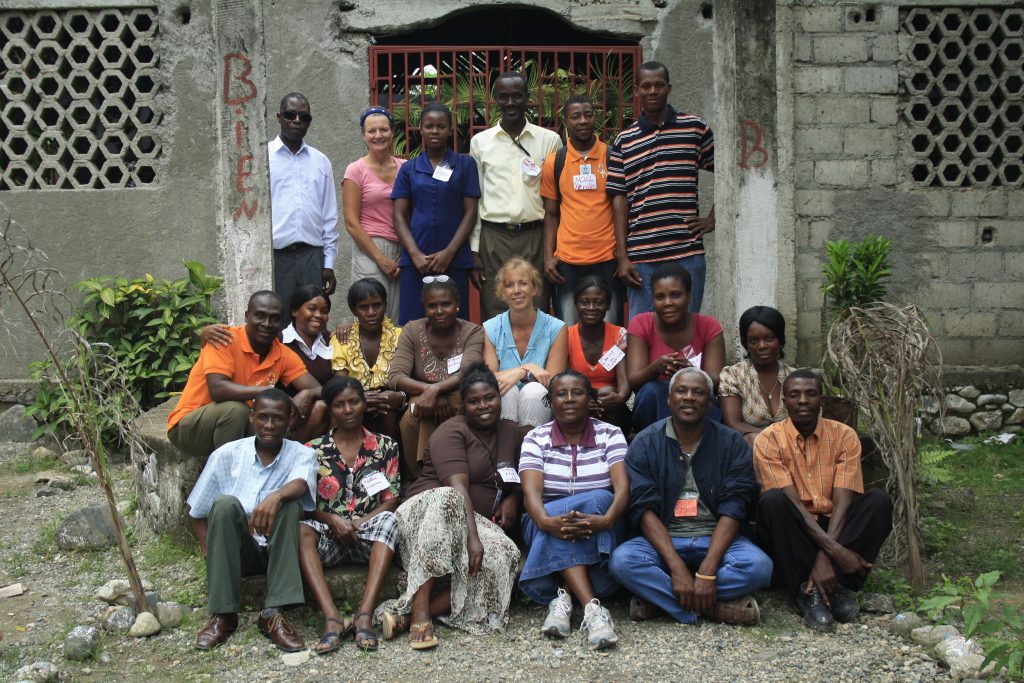
Workshop participants gather with Deborah (centre) for a group shot. (Photo D. Carr)
There were farmers, labourers, mothers, pastors, marketplace vendors. Their calloused hands stitched clothes, ground grain and cassava, and worked the land; they grew beans, corn, manioc, millet, sugar cane, bananas, peanuts and coffee. Most owned a few chickens, perhaps a donkey, goat or pig. Lucky ones had an emaciated cow they could sell for emergency funds—the Haitian equivalent of a bank account.
They lived in homes with roofs of corrugated tin—or sometimes dried banana fronds—and walls woven from stripped tree branches, then plastered with hand-mixed clay. The envied among them had cinderblock or concrete walls. Hope, in the form of gauzy curtains, hung in the doorways and windows of even the poorest of dwellings. Who, among us, doesn’t like beautiful things?
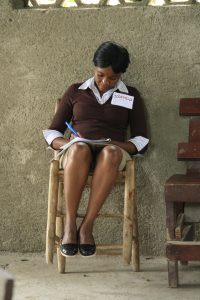 A prerequisite for this training was that everyone be able to read and write; however their education was rote learning in French—not their native Kreyole. They were punished if lessons were not memorized and recited with perfection. The free flow of creative thought was not encouraged.
A prerequisite for this training was that everyone be able to read and write; however their education was rote learning in French—not their native Kreyole. They were punished if lessons were not memorized and recited with perfection. The free flow of creative thought was not encouraged.
Rhonda’s and Elizabeth’s hope for our three-week tour of nine rural villages was that the freedom to write in their native language would enable people to express what they have long held inside. “Haitians have learned to master their emotions, “ says Rhonda, “and this is no doubt a way to cope with the rigors of life that they endure on a daily basis.” But they believed such stoicism also hindered their progress.
Like my North American students, the group seemed sceptical when I asked them to write of things like mangoes, hands, storms and trees—but when I specified that they could write freely about whatever came to mind on these subjects, then they threw themselves into the task.
After each exercise, they waved their hands for a chance to read their work. As Elizabeth translated, we were moved by the depth of insight and observation that had spilled onto their pages. They wrote of deep relationships, and the pain of losing friends and family. They wrote of fear and futility. They wrote of their dreams: opening a bank account, starting a business, buying a donkey or building, a concrete house to bring comfort to an aging mother.
The power of reflection
Simple subjects can evoke memories of special places, meaningful experiences and valuable lessons, serving as a back door into an experience. Through their stories, I came to know how they lived, and how they loved.
Josette, a tiny woman dressed in black, read her words about the misery of women with the authority of an impassioned orator. She finished in tears as she spoke of her mother’s death.
Edner, a tall, lanky man in a bright yellow shirt adorned with skyscrapers, wrote about his dream of earning just enough extra to send his children to school. “But I cannot see now how this can ever happen,” he said.
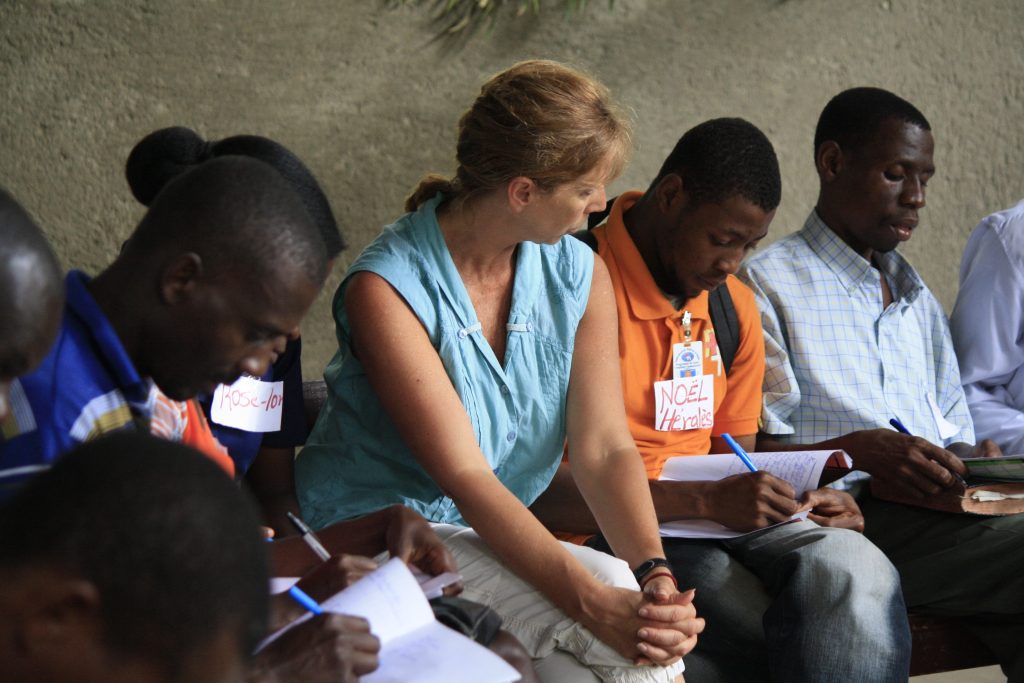
We talked about how their values emerged in their stories, and how they shared their culture, language and customs through the power of words. Afterwards, I asked how they might use this new skill.
They spoke of the need to document their stories and experiences for future generations. One man said, “May we go home and write our stories so that our children’s children will know who we were and what we did on this earth.”
A woman spoke up. “Starting tomorrow, I am going to fill all of these pages, and save them, so that [others] can see the stories, starting from the beginning. And I will continue to make my memory work, so people can see all of my history.”
The tradition of oral storytelling
That evening, we settled into the concrete dormitory reserved for travelers in Mombin Crochu, which would be our home base for several days. Our beds were wooden bunks with a thin mattress and a single blanket. The loose corrugated tin roof rattled in the wind, like someone tap-dancing across its waves; the louvered windows gave privacy, but no protection from insects. We enjoyed the rare luxury of a gravity-fed flush toilet, and a single light bulb that glowed with generator power for an hour each evening.
The sole village water pump was outside the building and the activity around it ceased only when the birds quieted, and darkness sent people home.
As shadows crept up the mountainside, we discussed the day over a supper of bread and labouyi—a soupy porridge made of cornmeal or plantain, flour, sugar and milk, prepared for us by village women.
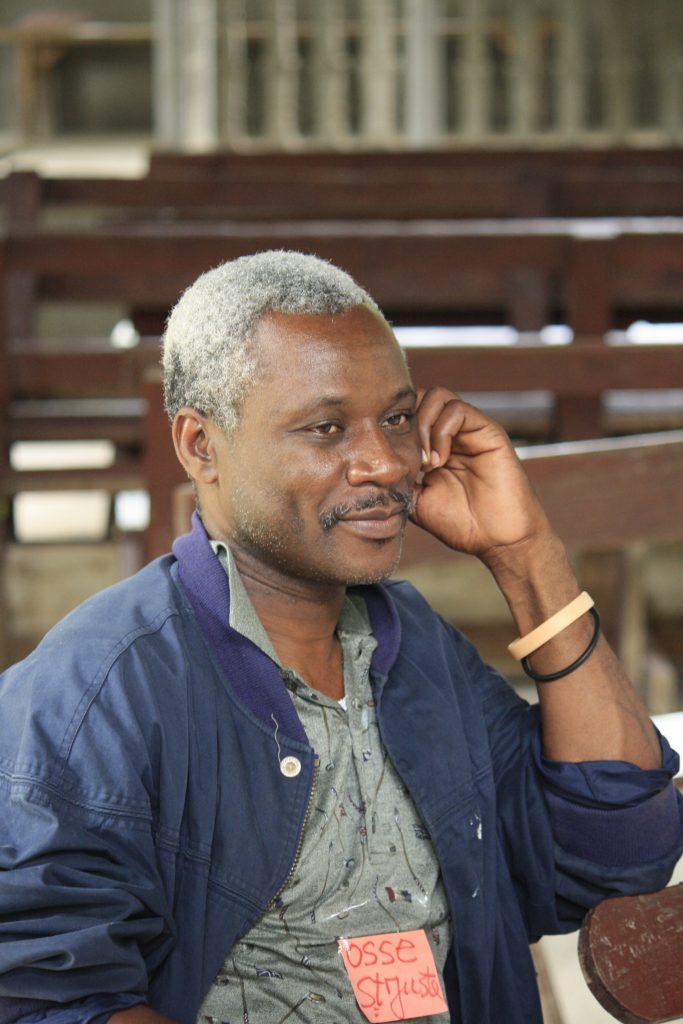
Osse St. Juste, Director, Medical Ambassadours of Haiti (Photo D. Carr)
This was a homecoming for Ossé, a kind and gentle man with boyish dimples, who had grown up in Mombin Crochu. Everywhere we travelled, he was welcomed with great enthusiasm and respect. The rest of us were greeted with cries of, ‘Blan! Blan!’ (Foreigner! Foreigner!), and treated to broad smiles when we waved. Ossé was pleased that the participants wanted to document their stories, and explained the Haitian tradition of oral storytelling.
“Families gather under the full moon to learn their history,” he said. In a land where activity ceases when darkness approaches, a bright moon extends the day. During these times Haitians share stories of ancestors, while children ask questions of their elders. But many of their emotional reactions to events remained unspoken, and unexpressed.
We talked about the responses to the writing exercises, how the act of writing seemed to crumble barriers to expression. “I saw people visibly emotional, and understanding came into their eyes,” said Rhonda. “They had these stories hidden and it’s like they simply needed permission or simple guidance to know the importance of the written word.”
The value of written stories
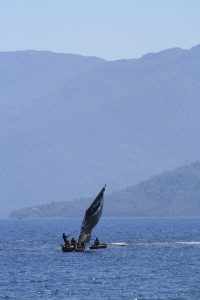 In the following weeks, we travelled from the mountains to coastal communities, where fishermen had a greater opportunity for income, but also the greater danger. They ventured far from shore in tiny, open boats with patched, handmade sails. Several times, a fear of water emerged in the writings.
In the following weeks, we travelled from the mountains to coastal communities, where fishermen had a greater opportunity for income, but also the greater danger. They ventured far from shore in tiny, open boats with patched, handmade sails. Several times, a fear of water emerged in the writings.
Whether farmer or fisherman, baker or labourer, mother or midwife, they began to see their own history integrally woven into Haiti’s. Their responses convinced us that writing could also help Haitians discover their worth as individuals, and to appreciate the wealth of their experiences and their memories.
One man said, “You taught me how to write a story and that makes me feel like an important person.”
Although continents and seas may separate us, Haitians had learned—just like the people I coach back home—that writing is not only about recording their thoughts and memories, but also a way of coming to know themselves, their own strengths and abilities. And by sharing these things, we build connections and deepen our relationships to each other. Stories linger, long after we are gone.
Weeks later, as I made my way home to New Brunswick, I considered how I had confronted my fears and tested my inner strength. I had learned that the freedom to write is a gift, and that we are all bound together by our stories.
I carried my own journal of jotted memories, a new sense of purpose, and the words of one fellow settling in my heart…“We would like for the heavens to hear what we say, and for God to take notes, so that this can happen again.”
